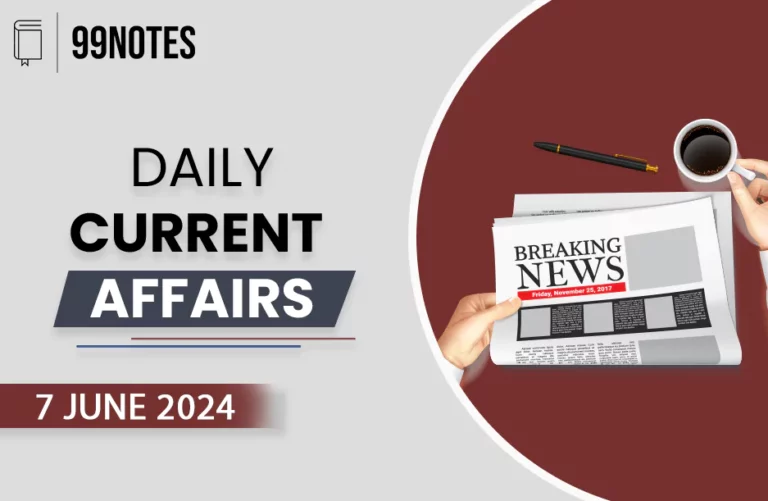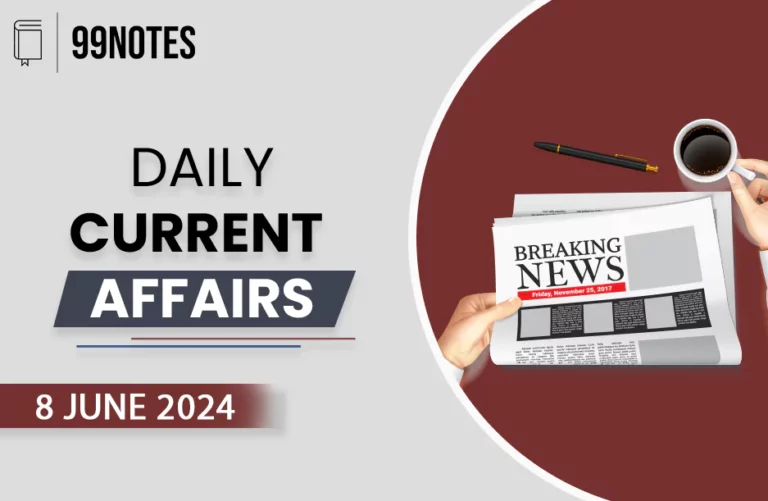15 November 2023 : Daily Current Affairs
Daily Current Affairs
15-November-2023
1. Wholesale prices remain in deflation zone in Oct.
Topic: GS3 – Indian economy.
Context:
- India’s Wholesale Price Index (WPI) showed deflation for the seventh consecutive month in October.
What is deflation?
- Definition: Deflation is a decrease in the general price level of goods and services in an economy over time.
- Opposite of Inflation: While inflation represents a rise in prices, deflation indicates a decline.
- Impact on Economy: Deflation can lead to reduced consumer spending as people anticipate lower prices in the future.
- Business Impact: Businesses may experience falling revenues and profits, leading to cost-cutting measures and potential job losses.
- Debt Challenges: Deflation increases the real burden of debt as the value of money rises, making it harder for borrowers to repay loans.
- Central Bank Response: Central banks may implement monetary policies, such as lowering interest rates, to counter deflation and stimulate economic activity.
- Risk of Deflationary Spiral: Persistent deflation can lead to a cycle where falling prices and demand create a self-reinforcing negative economic cycle.
- Factors: Deflation can be caused by factors such as decreased consumer demand, technological advancements, or a credit crunch.
Question: Discuss the economic implications of deflation on a nation’s economy. Examine the challenges faced by businesses, individuals, and policymakers during a period of deflation.
2. The Qatar death row and India’s options
Topic: GS3 – International relations
Background
- In October 2023,Qatar’s local court sentenced eight former Indian Navy officers to death.
- The officers were arrested in August 2022 in Doha by Qatari intelligence authorities on charges of espionage.
- Legal proceedings encountered delays,including the rejection of the initial bail plea one month after the arrest.
- The first trial was held in March 2023.
Legal Options
- India has the option to initiate legal appeals within the Qatari legal system.
- India could turn to the ICJ as a means of redress if legal appeals in Qatar’s judiciary do not yield the desired outcome.
- India could also pursue a legal battle with the aim of reducing the sentence to imprisonment.
- India can also pursue an agreement pertaining to the transfer of sentenced prisoners with Qatar.
Diplomatic Efforts
- India has the capacity to initiate diplomatic efforts aimed at resolving the case.
- India can harness its robust ties with Qatar to exert pressure on the Qatari government to adopt a more lenient approach towards the detained individuals.
- India can also seek the support of numerous global human rights organisations in advocating for the Indian Navy officers.
Conclusion
- India’s response to this challenging diplomatic issue should take into account the implications of the Vienna Convention on Consular Relations,international precedents, and the broader context of India-Qatar relations.
3. The economy of a world without work
Topic: GS3 – economy.
Musk’s Vision of an AI-Powered Future
- Billionaire Elon Musk believes that AI will eventually substitute for all human labor,both physical and cognitive.
- In this future,individuals would not need to work for a living but could pursue work for personal fulfillment.
- Musk’s vision is an extension of John Maynard Keynes’ theory that technological advancements would lead to a reduction in working hours.
Karl Marx’s Critique of Work Under Capitalism
- Karl Marx believed that work provides meaning to human life and that capitalism alienates individuals from their labor.
- Under capitalism,the product of human labor is not enjoyed by the laborers but is appropriated by the owners of capital.
- Marx argued that the ideal state is not one where AI replaces human labor but where individuals can utilize AI to enhance their work without it being exploited.
The Economic Implications of AI
- In a capitalist system,individuals can only access basic resources through income derived from work.
- In a world without work under capitalism,those who cannot find work would not be able to access basic resources.
- A world without work requires a different economic system,one with a universal basic income and different institutional arrangements regulating production and distribution.
Conclusion
- Musk’s vision of an AI-powered future is speculative and may require significant changes to the current economic system.
- Fully understanding the impact of technological innovations requires considering the prevailing economic institutions.
4. How does an electric battery work and what are the different types?
Topic: GS3 – Science and technology
What Led to the Invention of the Electric Battery?
- Luigi Galvani’s 1780 experiment with frog legs demonstrated the production of electricity from different metals.
- Alessandro Volta’s 1800 voltaic pile was an early battery design that produced a steady electric current.
- John Daniel further improved on Volta’s design with a more sophisticated battery setup.
- Michael Faraday’s work in the early 19th century explained the underlying principles of these batteries.
What is an Electric Battery?
- A voltaic or galvanic cell uses redox reactions to produce an electric current.
- A battery consists of two half-cells:an anode and a cathode.
- The anode is the negatively charged electrode where electrons are released through oxidation.
- The cathode is the positively charged electrode where electrons are consumed through reduction.
- The electrolyte allows the transfer of ions between the electrodes.
- The external circuit connected to the electrodes draws the electron flow for various applications.
- A battery is a collection of such cells.
Key Concepts of a Battery
- The source voltage is the energy imparted to the electrons by the half-cells.
- The terminal voltage is the driving force that pushes electrons from the anode to the cathode.
- The higher the source voltage,the greater the cell’s electrochemical potential.
- Corrosion,such as galvanic corrosion, can degrade the performance of electrochemical cells.
Types of Batteries
- Lithium-ion (Li-ion) batteries are rechargeable and have a high energy density.
- Li-ion polymer cells are a type of Li-ion battery with a semisolid polymer gel electrolyte.
- Hydrogen fuel cells convert hydrogen into protons and electrons,producing electricity and water.
- Green hydrogen production is a focus of the Indian government’s National Green Hydrogen Mission.
5. World is severely off track to limit planet-heating emissions, says UN
Topic: GS3 – climate change
UN Warns of Inadequate Global Response to Climate Change
- A new UN assessment reveals that current climate pledges are insufficient to curb greenhouse gas emissions.
- The world is on a path for only a 2% reduction in carbon emissions by 2030,far short of the 43% reduction needed to limit warming to 1.5 degrees Celsius.
- UN officials warn that the world is “severely off track” and urge nations to take more urgent action to address the climate crisis.
Global Heating Limit in Peril
- Scientists warn that humanity is dangerously close to exceeding the 1.5 degrees Celsius limit for global warming.
- Crossing this threshold would lead to more severe and widespread climate impacts.
Urgent Need for Action
- UN Secretary-General Antonio Guterres calls for immediate and significant action from world leaders to avert a climate catastrophe.
- The upcoming COP-28 climate negotiations are seen as a critical opportunity to course-correct and forge a more ambitious global response to climate change.
6. ‘India can be an alternative to China in manufacturing’
Topic: GS3 – Indian economy.
Context:
- DHL Group CEO affirms that business has normalized post-COVID.
- Identifies three key elements: normalization of freight rates, impact of rising interest rates, and continued e-commerce transition.
- Discusses India’s potential as a viable alternative in the “China Plus 1” strategy.
- Expresses confidence in India’s capacity to become a global manufacturing hub.
- Acknowledges positive steps by the Indian government in infrastructure investment.
- Emphasizes the importance of openness to trade for India’s success in global manufacturing.
How India can be an alternative to China in manufacturing:
- Infrastructure Investment: Continued investment in infrastructure to enhance manufacturing capabilities.
- Openness to Trade: Embrace openness to trade for global integration and competitiveness.
- Global Manufacturing Hub: Develop policies that position India as a global manufacturing hub.
- Diverse Supply Chain: Build a diverse and resilient supply chain to attract international businesses.
- Government Support: Provide supportive policies and incentives for manufacturing industries.
- Strategic Positioning: Leverage geopolitical and economic factors to position India as an attractive alternative.
7. Secrecy and no tax — reason why Indians look at Cyprus
Topic: GS2- IR
Context
- It has come to light that Cyprus plays a bigger role than previously thought in helping other dictators and the dictatorial government of Russian President Vladimir Putin transfer illegal money.
- The International Consortium of Investigative Journalists (ICIJ), Paper Trail Media, and 67 other media partners, including The Indian Express, performed an investigation that led to this discovery.
Cyprus Confidential Overview:
- A worldwide offshore probe with 3.6 million papers in both Greek and English is called Cyprus Confidential.
- These records reveal a trail of businesses founded in Cyprus, a tax haven, by powerful and affluent people from throughout the world.
- Working with the International Consortium of Investigative Journalists (ICIJ), approximately 270 journalists from more than 60 media outlets across 55 nations and territories contributed to the investigation.
India Investigation Highlights:
- The investigation’s aspect centered on India’s attempts to expose the opacity surrounding governmental and regulatory organizations.
- The documents disclose the manner in which entities with offshore residency that are under Indian management carry out financial operations using orders that come from Indian persons.
Offshore Companies in Cyprus:
- It is permissible to establish offshore companies in Cyprus thanks to double-taxation avoidance agreements (DTAAs) with a number of nations, including India.
- Due to their low tax rates, these agreements draw in companies and people looking for legitimate tax advantages.
- Nonetheless, strict confidentiality rules and a lack of regulatory scrutiny are characteristics of these states.
Evolution of India’s Tax Treaty with Cyprus:
- Over time, the tax treaty between Cyprus and India has changed. Cyprus was a preferred location for investors due to the treaty’s exclusions from capital gains tax prior to 2013.
- Cyprus has been subject to stricter transaction oversight and higher withholding tax rates since it was designated as a Notified Jurisdictional Area (NJA) in 2013.
- 2016 saw a revision to the DTAA that removed Cyprus’ NJA status and instituted source-based capital gains taxation.
Tax Benefits in Cyprus:
- Cyprus provides tax advantages to foreign corporations, offering a 4.25% tax rate for those under its management and control. Offshore partnerships and branches are completely exempt from taxes when operated overseas.
- Dividends are not subject to withholding tax, and shares transferred or sold in offshore companies are not subject to capital gains tax. Additionally, Cyprus guarantees beneficial owners’ confidentiality.
India-Cyprus DTAA Mechanism:
- Cyprus can be used for tax planning due to its low tax regime, thanks to the Cyprus-India DTAA.
- Cyprus is a popular location for foreign investors to establish investment enterprises in order to take advantage of the treaty.
- After the 2016 DTAA amendment, offshore entities investing in India now have Cyprus as an alternative to Mauritius.
Offshore Trusts in Cyprus:
- Offshore trusts are permitted by Cyprus International Trust Law and are free from estate duty and income and gain taxes provided that the assets and income are located outside of Cyprus.
- Because offshore trusts provide confidentiality, business owners can avoid paying taxes that would have been due if their foreign operations’ income had been sent back to their home country.
Challenges and Scrutiny:
- The Indian tax department may still probe entities in treaty-holding nations if it is shown that a firm has been inserted to evade taxes, even in the case of DTAAs.
Under such circumstances, tax officials may examine the entire transaction
8. Why Rahman’s version of an iconic patriotic song has upset many in Bengal
Topic: Culture
Context:
- The production company of the movie “Pippa,” Roy Kapur Films, has apologized for the song “Karar Oi Louho Kopat” that appears in it.
- A R Rahman wrote the new melody for the song, which was written by Bengali poet Kazi Nazrul Islam in 1922 as a nationalist hymn against the British Raj.
- The apology recognizes the emotional connection that listeners may have to the song’s original composition and expresses apologies for any unintentional distress caused by the reworking of the song.
Historical Context of the Song:
- The poem was first published in 1922 and was later included in Nazrul’s book “Bhangar Gaan.”
- The song functioned as a nationalist hymn against British authority.
- Known as the “Rebel Poet,” Nazrul penned more than 4,000 songs advocating for change and protest, making him a national hero in Bangladesh, Bengal, and the Bengali diaspora.
- The song’s refrain, which represents resistance to injustice, calls for smashing prison’s iron gates.
Controversy and Alteration of the Song:
- Rahman’s rendition of the song in “Pippa,” in which he departs from the classic piece renowned for its patriotic fervor and employs a different tune from the original, is what has sparked the issue.
- Since they view Rabindra sangeet and Nazrul geeti as essential to Bengal’s cultural legacy, many Bengalis are against their being altered.
- Nazrul’s passionate protest song is described as being serious, while Rahman’s performance is described as whimsical, folksy, and romantic.
9. Centre considers seeking access to anonymised data of big tech firms
Topic: GS2- Governance
Context:
- According to reports, the Indian government is thinking of ordering big digital companies like Facebook, Google, and Amazon to provide any anonymized personal information they have to a government-backed database.
- If approved, this action may lead to debates about the ownership of intellectual property rights to such information.
- The government intends to control the sharing of non-personal data through the impending Digital India Bill, the replacement for the Information Technology Act, 2000, as it sees datasets as essential to artificial intelligence (AI) models.
Inclusion in Digital India Bill:
- The Digital India Bill’s proposed clause requires large digital businesses to upload all of their non-personal data to the India datasets platform. Non-personal data, also known as anonymized personal data, is information that is aggregated and does not include personally identifiable information.
- Examples of this type of data include traffic, weather, and health statistics. The law seeks to impose legal obligations on businesses, depending on user agreements in their terms of service, to deposit said data to the India datasets platform.
Challenging Exclusive Ownership Claims:
- According to the government, bigtech companies cannot claim exclusive ownership as they have profited from developing algorithms using non-personal data about Indians.
- The recently announced Digital Personal Data Protection Act, 2023, the proposed Indian Telecommunication Bill, 2022, and a policy pertaining to non-personal data governance are among the legislative initiatives that comprise the entire legal framework that incorporates the Digital India Bill. This year, the bill’s release is not anticipated.
India Datasets Program and Monetization:
- A uniform national platform for data-sharing and exchange that serves a variety of stakeholders is the description provided for the India datasets program.
- Governments at the federal, state, and local levels, public sector initiatives, private sector businesses, MSMEs, startups, academia, researchers, civil society, and media outlets are all involved.
- As per a working group assessment, the platform has the potential to generate revenue from non-personal data and enhance the AI ecosystem by offering a strong base for data-driven innovation.
Evolution of Government’s Stance:
- The government’s position on non-personal data ownership has changed. In October, Minister of State for IT Rajeev Chandrasekhar made a suggestion that the government would take a different path.
- The committee led by Infosys co-founder Kris Gopalakrishnan proposed the idea of generating financial gains from combined non-personal datasets, highlighting the significance of high-value datasets for fostering innovation and guaranteeing national security.
- The government’s approach marks a move from encouraging private companies to share non-personal data to potentially requiring them to do so.
10. Trapped Workers in Uttarkashi Tunnel: Rescuers Employ “Trenchless” Technique
Topic: Disaster Management
Context:
- Forty workers were trapped when an under-construction tunnel on the Yamunotri National Highway collapsed in Uttarkashi, Uttarakhand. The workers have not been able to communicate for more than two days, even with the provision of food and oxygen as well as walkie-talkies.
- There hasn’t been much success using the “shotcrete method” in preventing additional collapse and clearing debris with big excavators. Rescuers are now employing mild steel pipes in a “trenchless” technique to make passageways through the rubble.
Challenges in Traditional Rescue Methods:
- Conventional techniques, which involved shotcreting and large excavator equipment, encountered difficulties because falling debris hampered work.
- Debris descending from the upper section of the tunnel continued to impede efforts to provide a safe route.
- Therefore, it was decided to use a “trenchless” method in order to free trapped workers and prevent further deterioration of the structural instability.
The “Trenchless” Technique:
- The “trenchless” technique entails drilling through the debris using an auger machine equipped with a helical screw blade. By minimizing excavation, this technique lowers the possibility of more collapse and damage.
- After that, 900 mm diameter mild steel pipes are pushed into the drilled hole to make a space big enough for people to crawl through.
- This method provides a useful substitute for obtaining access to and extracting people who are subterranean during rescue efforts.
Ongoing Challenges and Delays:
- Implementing the “trenchless” technique has not been without its obstacles. Drilling was delayed as more debris fell onto the platform when rescuers were getting ready to use the auger equipment.
- Authorities reassure that in spite of obstacles, they are dedicated to conquering problems and guaranteeing the security of both stranded laborers and rescuers.
Collaboration with Experts:
- To plan and carry out the rescue operation efficiently, the state government is working with professionals from companies like NHAI, Rail Vikas Nigam Limited, National Housing and Construction Limited, L&T, Tehri Hydro Development Corporation, BRO, and National Highways & Infrastructure Development Corporation Ltd.
11. Four out of five organ recipients in country are men: NOTTO data
Topic: GS2- Health
Context:
- The National Organ and Tissue Transplant Organization (NOTTO) has compiled data that shows a notable gender gap among organ recipients in India from 1995 to 2021.
- During this time, 29,695 out of 36,640 patients had transplants; this means that four out of every five organ recipients were men.
- The gender distribution is skewed, which draws attention to the persistent problem of women being disproportionately underrepresented among transplant recipients.
Gender Disparity Challenges:
- Experts stress that in order to reverse the trend and solve the gender gap in organ transplants, awareness must be raised.
- Although research indicates a greater proportion of female donors, specialists maintain that legal protections guarantee that consent is not forced.
- Experts agree that there is gender prejudice among donors as well as beneficiaries. They point out that counseling initiatives have reduced the gender disparity in donation rates and increased the share of male contributions.
Changing Trends in Donor Gender:
- According to expert findings from the liver transplant program at Apollo Hospital, pointing to a change in the demographics of donors. At first, moms made up 75% of donations while men made up 25%.
- But in recent years, mothers have contributed 51% of all gifts, while fathers have contributed 49%.
- The shift is credited to counseling initiatives that answer queries and allay fears, increasing the comfort level of prospective male organ donors.
Importance of Awareness:
- Experts stress that in order to combat gender-based tendencies in surgery, particularly transplants, knowledge is crucial.
- They also emphasize the importance of reassuring parents that their girls’ lives after transplantation are normal and addresses issues with puberty and fertility.
- Making sure that recipients of transplants are chosen for their medical need rather than their gender is the aim.
Overall Increase in Transplants:
- According to NOTTO data, the nation’s total number of transplant surgeries has increased and is expected to reach a record high of 16,041 procedures in 2022.
- Tamil Nadu continues to lead in deceased donor transplants, but Delhi now leads in living donor transplants.
- Additionally, a record 243 heart and 144 lung transplants were performed in 2022.
For Enquiry

15 November 2023 : Daily Current Affairs

15 November 2023 : The Hindu Editorial Notes PDF

14 Nov 2023 : Daily Quiz

14 Nov 2023 : Daily Answer Writing

10 Nov 2023 : Daily Answer Writing

14 Nov 2023 : Indian Express

14 Nov 2023 : PIB

14 November 2023 : Daily Current Affairs

14 November 2023 : The Hindu Editorial Notes PDF

10 Nov 2023 : PIB
Daily Current Affairs 15 November 2023 : Daily Current Affairs Daily Current Affairs
14-November-2023
1. Retail inflation eases to a four-month low of 4.87% in October.
Topic:…
November 2023 The Hindu 15 November 2023 : The Hindu Editorial Notes PDF The Hindu Editorial
15-November-2023
1. A Norwegian perspective of India’s digital journey.
Topic:…
Daily Quiz 14 Nov 2023 : Daily Quiz 14 Nov 2023 : Daily Quiz…
mains answer writing 14 Nov 2023 : Daily Answer Writing Mains Answer Writing
14-November-2023
Q1) “The dynamics of center-state relations in recent times reflect…
mains answer writing 10 Nov 2023 : Daily Answer Writing Mains Answer Writing
10-November-2023
1. Any federal system is bound to have asymmetries, therefore…
Indian Express 14 Nov 2023 : Indian Express Indian Express
14-November-2023
1) With a little help from the Sun
Context:
The emergence of clean…
November 2023 PIB 14 Nov 2023 : PIB PRESS INFORMATION BUREAU
14-November -2023
1. ‘AAINA Dashboard for Cities’ portal launched.
Topic:…
Daily Current Affairs 14 November 2023 : Daily Current Affairs Daily Current Affairs
14-November-2023
1. Retail inflation eases to a four-month low of 4.87% in October.
Topic:…
November 2023 The Hindu 14 November 2023 : The Hindu Editorial Notes PDF The Hindu Editorial
14-November-2023
1. Enhancing representation, for a just electoral system.
Topic:…
November 2023 PIB 10 Nov 2023 : PIB PRESS INFORMATION BUREAU
10-November -2023
1. ESIC observes National Ayurveda Day (Dhanwantari Jayanti)…



